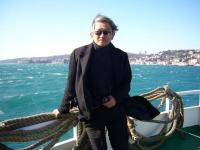I wish to comment on some of the
bacaan (readings, recitations of Quranic passages), in addition to the azan, that is being broadcast through loudspeakers today, resulting in disturbance to the public. Such bacaan has confused non-Muslims who mistake them for being part of the azan (call to prayer).
Some are defending the practice of broadcasting the bacaan on the grounds that since it is the reciting of the Quran or zikir (devotional songs), such a practice ought to be held in high regard. They believe their uncompromising attitude in this matter represents 'the struggle to defend Islam'. I would like to comment on this as follows:
1. That which Islam instructs to amplify, is only the azan. Apart from this, there is no instruction to amplify anything else, to the point of causing disturbance to others.
In fact, such acts are forbidden by the Prophet Muhammad s.a.w. Furthermore, in Islam, care is taken regarding the tranquillity of others, with exceptions, if any that are permitted by Islamic law.
2. Although the readings of the Quran and zikir are excellent practices, we cannot force others to listen to our prayer recitations. Perhaps there are others who prefer to read their prayers themselves, or would like to recite during other times of the day. Or one may be ill, or may not be observing prayers at the time, for example a woman during her period, or non Muslims and so on.
3. Many non-Muslims are confused between the azan and readings of the Quran that do not constitute azan, that are being broadcast through loudspeakers.
They are under the belief that such recitations are instructed by Islam, and therefore get the wrong impression of Islam as a harmonious religion. Furthermore, the recitations are prolonged, while the actual call to prayer lasts no more than five minutes.
4. In truth, the Prophet himself forbade people from amplifying their readings of the Quran in mosques such that it would disturb others.
In the hadith of the Prophet, Abu Sa'id al-Khudri said : "When the Prophet once prayed at the mosque, he heard someone reciting the Quran loudly while the Prophet was at the place of worship.
“The Prophet then lifted the curtains (between them) and said, “Listen ye who supplicate to his God, let not these of you cause disturbance to others. Do not raise your voice in reciting prayers, above that of the others.” (Recorded by Abu Daud).
In this hadith the Prophet forbade the raising of voices in reciting prayers in the mosques that may interfere with other’s prayers, or aggravate others. If this is so, what more amplifying through loudspeakers that may disturb those outside the mosque? There may be others with infants or who are ill, who may be disturbed.
A highly esteemed present-day scholar, Al-Sheikh Muhammad Salih al-Hadith Uthaimin commenting on this hadith once said: "We are witnessing today that which was described in the hadith (cited above). We are seeing those who are doing (what the Prophet describes) by conducting prayers using loudspeakers outside the mosque.
"If their actions cause grief to those around them, then they have sinned...they without doubt should avoid such actions that furthermore do not bring any benefit whatsoever, because one does not pray with those who are outside the mosque, but only with those who are within the mosque.
"So we remind our brothers, especially the imams in the mosque, not to practice this (using amplification). There may be those who have already prayed and have to sleep and rest, perhaps there are those who are ill who will be disturbed, or the mosque may be close to people’s homes....
"In conclusion, this problem (may have aggravated neighbourhoods or homes) but brings no benefit whatsoever (to the devotee)." (Ibn Uthaimin, Riyadh al-Salihin Syarh)
Imagine, this statement was issued by a distinguished and senior ulama in Saudi Arabia, a country whose population is completely Muslim. What more for a (multiracial) country like ours.
5. Ulama of the past have also spoken on this matter, that recitations (other than the azan) are forbidden because they can disturb the general public.
Al-Imam al-Hafizd Ibn Jauzi (died 597H) said: "Amongst the tricks of Satan are those who mix up the azan with reminders, praise and advice. They have turned the azan into something jumbled.
"The ulama disapproves of all that is added on top of the azan. Very often we learn of people who get up in the middle of the night and serve up reminders and advice on top of the minarets.
“There are those amongst them who read the Quran so loudly that they disrupt the sleep of others and disturbs those who are conducting night prayers. All these acts bring dishonour.” ( Ibn Jauzi, Talbis Iblis, 159, Beirut: Dar al-Kutub al-‘Ilmiyyah).
These prohibitions were made by ulama before loudspeakers were in existence; what more if they learn of the kind of loudspeakers we have today?
Therefore with this, Muslims ought to stop reciting through loudspeakers that may disturb those outside the mosque.
Adhering to this advice (not to use loudspeakers) is not a political issue at all, but merely following the instructions of the Prophet and at the same time preserving the image of Islam as harmonious.
Raising one’s voice in prayer does not add to one’s love towards Islam, but in fact creates misunderstanding amongst many quarters.
Mohd Asri zainul Abidin
The writer is former Perlis mufti. This letter was originally submitted in Malay.
Subscribe to:
Post Comments (Atom)

No comments:
Post a Comment